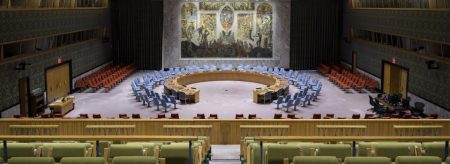India to be Non-Permanent member of United Nation Security Council 27/06/2019 – Posted in: Daily News – Tags: India and UNSC
INDIA TO BE NON-PERMANENT MEMBER OF UNITED NATION SECURITY COUNCIL
For: Preliminary & Mains
Topics covered: UNSC, Permanent and Non-Permanent members, India and UNSC, Why is matters for India
News Flash
Fifty-five countries of the Asia-Pacific group at the United Nations unanimously endorsed India’s candidature for a non-permanent seat of the Security Council for a two-year term in 2021-2022.
United Nations Security Council is composed of 15 members
- Permanent Members
The five permanent members of the Council are China, France, Russia, UK, and the US.
- Non-Permanent Members
The 10 non-permanent seats are distributed on a regional basis: five for African and Asian States; one for the Eastern European States; two for the Latin American and Caribbean States; and two for Western European and other States.
Currently, the 10 non-permanent members are Belgium, Cote d’Ivoire, Dominican Republic, Equatorial Guinea, Germany, Indonesia, Kuwait, Peru, Poland, and South Africa.
Background
Until now, India has been a non-permanent member of the UN Security Council for seven terms: 1950-51, 1967-68, 1972-73, 1977-78, 1984-85, 1991-92 and most recently in 2011–2012.
Each year the 193-member General Assembly elects five non-permanent members for a two-year term at the UN high-table.
Earlier this year, India had said that a majority of the UN members support the expansion of the permanent and non-permanent membership of the Security Council.
Place of India in UNSC
- India is the largest contributor to the UN Peacekeeping Operations (UNPKO), with nearly 180,000 troops serving in 44 missions since it was established.
- India is also among the highest financial contributors to the UN, with the country making regular donations to several UN organs like the United Nations Democracy Fund (UNDEF).
United Nation Security Council
The UNSC is one of the six principal organs (United Nations Secretariat, United Nations General Assembly, International Court of Justice, United Nations Security Council, United Nations Economic and Social Council, United Nations Trusteeship Council) of the United Nations, charged with ensuring international peace and security, accepting new members to the United Nations and approving any changes to its charter.
It is the only body of the United Nations with the authority to issue binding resolutions to member states.
The Security Council held its first session on 17 January 1946 at Church House, Westminster, London.
It is headquartered in New York City.
Powers and Functions of the Security Council is to:
- Maintain international peace and security in accordance with the principles and purposes of the United Nations
- Investigate any dispute or situation which might lead to international friction
- Recommend methods of adjusting such disputes or the terms of the settlement
- Formulate plans for the establishment of a system to regulate armaments
- Determine the existence of a threat to the peace or act of aggression and to recommend what action should be taken
- Call on Members to apply economic sanctions and other measures not involving the use of force to prevent or stop aggression
- Take military action against an aggressor
- Recommend the admission of new Members
- Exercise the trusteeship functions of the United Nations in “strategic areas”
- Recommend to the General Assembly the appointment of the Secretary-General and, together with the Assembly, to elect the Judges of the International Court of Justice.
Benefits to India from the permanent seat at UNSC
- Permanent membership will provide the veto power, which India could use to defend its interests, say against Pakistan (just like Russia did over the civil war in Ukraine).
- The sheer prestige associated with permanent membership of a multilateral forum.
- India’s elevation will also be an acknowledgment of its rise as a global power, ready to play a key role in the council’s objectives of international peace and security.
- The permanent seat will enable India to have a greater say in the global geo-politics (like, decisions of imposing sanctions or the implementation of the verdict of International Court of Justice)
- UNSC permanent seat will also give a formal endorsement to India as the responsible nuclear power.
- It will strengthen the mechanism to address the external security threats against India.
Source: Indian Express and other standard sources
You can follow us on LinkedIn and for more updates related to UPSC IAS Preparation, Like our Facebook Page and subscribe our Diligent IAS Youtube Channel

